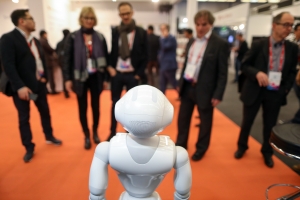عرض العناصر حسب علامة : الروبوتات
الثلاثاء, 04 يناير 2022 16:19
اتجاهات المحاسبة في الغد
معلومات إضافية
-
المحتوى بالإنجليزية
In our lifetimes, we’ve all seen technology accelerate every industry it touches. Based on my more than 20 years of experience working in the accounting tech industry, I’ve witnessed this transformation firsthand. Most accountants already use digital tools and are optimizing processes to go paperless. Yet as technology continues to advance and further automate numerous functions, conversations turn to the prospect of human-less accounting.
Will Accountants Be Replaced By Robots?
The short answer is no. Discussions of a robot revolution are honestly more sensational than factual. In the real world, the technologies transforming the financial industry will in no way render the human factor redundant.
Instead, technologies like the cloud, artificial intelligence (AI) and blockchain will empower accountants -- and the entire financial services industry -- by reducing manual data entry and improving the speed, accuracy and quality of data.
PROMOTED
Accountants who embrace the trends below will have a greater capacity to advance their roles as trusted, value-added advisers and analysts -- rather than number-crunchers or the dreaded “bean counter.”
Harnessing The Power Of The Cloud
By 2026, the global market for accounting software will have a value of $11.8 billion (subscription required), according to Accounting Today. Digital is already a given in the accounting industry. With cloud accounting and software-as-a-service (SaaS) applications and the ability to access financial data from any internet-enabled device, virtualization is the new norm.
The growing ecosystem of applications that integrates with accounting platforms has also proven to be efficient by connecting and streamlining back-office processes for a wide range of businesses and industries.
A counterpoint to cloud adoption rates: Neither desktop nor enterprise software will be going away anytime soon. One of the greatest examples of this is while QuickBooks Online reached 2 million subscribers worldwide in 2017, there’s still a substantial user base for QuickBooks Desktop. Of those online subscribers, 80% are first-time users for any kind of accounting software. These users aren’t migrating from desktop to the cloud; they’re starting online. As the target users for QuickBooks Online are small to medium-sized businesses, accountants play a pivotal role in introducing businesses to the cloud.
Accelerating Automation
By 2020, labor-intensive tasks like tax preparation, payroll, audits and banking will be fully automated -- a trend that’s considered the greatest transformation since the introduction of double-entry bookkeeping 500 years ago.
Artificial intelligence (AI) and machine learning won’t make human intelligence extinct. What they’ll actually do is give accountants better access to a range of near-real-time information from a greater number of sources.
For example, a big-picture part of what one of my companies, PayPie, will be doing is using blockchain and smart contracts to exchange secure information between businesses and lenders. AI components will be used to verify the information and ensure that both parties see the information in near-real time.
While algorithms will continue to get more powerful and efficient at compiling big data, computers are only great transactional machines. They can’t replace the interpretive capacity of the human mind. It’s also pretty hard to teach a machine common sense.
Technology will give us access to better data, but accountants are the ones who’ll have to apply this information to the real world to provide crucial business insights and intelligence.
Breakthroughs Via Blockchain
Assuming that cryptocurrencies are the only use for blockchain is like thinking that binge-watching is the only use for online streaming. At the recent Accounting and Finance Show L.A., blockchain (subscription required) and smart contracts dominated conversations.
A single-ledger technology, blockchain is a delivery method that lets users from several sources access the same information in near-real time. For instance, if a business’ risk profile is hashed (tied) to the blockchain, the business and its potential lenders or investors can all access the profile simultaneously.
نشر في
موضوعات متنوعة
موسومة تحت
الإثنين, 03 يناير 2022 15:52
الروبوتات ليسوا محاسبين!
كُتب الكثير في العام الماضي عن أتمتة العمليات الروبوتية (RPA)، ولسبب وجيه. من خلال تسهيل التكامل الأوسع للأنظمة المالية المتباينة وتطبيقات البرامج، يُعد RPA مزيد من الكفاءة لمؤسسات التمويل والمحاسبة. ولكن هل الروبوتات بديل للمحاسبين كما أثبتت بعض المقالات؟
معلومات إضافية
-
المحتوى بالإنجليزية
Much has been written in the last year about robotic process automation (RPA), and for good reason. By facilitating broader integration of disparate financial systems and software applications, RPA promises more efficiency to finance and accounting organizations. But are robots a substitute for accountants, as some articles have attested? Not by a long shot.
RPA captures, manipulates and interprets transactional data flowing from myriad IT systems and applications, effectively taking these repetitive tasks from accountants. That’s a good thing, as it frees up the accounting staff to become strategic accountants. The “robots” liberate accountants to do what they have longed to do — make sense of the financial data to improve business decisions.
RPA is just the latest iteration in a long progression of F&A software tools designed to improve efficiency and data accuracy, including our own here at BlackLine. RPA extends the automated functionality of ERP systems beyond the range of application programming interfaces (commonly known as APIs) and simple object access protocol, which are used to integrate the ERP system with other IT applications. Instead of the customary weeks it takes to link these systems, RPA pares the time down to a matter of days.
Trends and Technologies Shaping the Future of Tax and Accounting
WOLTERS KLUWER
There are some studies, such as that by the Hackett Group, that suggest that automated tools may lead to a reduction in headcount. But robo-accountants are not actual accountants. Despite the enormous power and promise of digital solutions, there will always be a need for the human connection. Robots may replicate what people do, but they are unemotional, have no intuition and cannot be motivated in a common cause. They’re simply machines making routine work easier and more efficient.
Turning dislocation into transformation
Today’s accountants should not fear automation; rather, they should embrace these tools to become strategic accountants. When machines replace traditional forms of work, they simultaneously open the door to other options. People are liberated to be more creative, engaged and productive. Let the robots handle rote administrative processing. Accountants’ skills are far too nuanced to squander on such tasks.
A case in point is the competitive advantage of extracting deeper meaning from internal and exogenous financial data. The internet is inundated with millions of data sets that may have import in business decisions. Software can narrow the field, but someone has to interpret the data to determine where best to grow the business or pull back.
Accountants can perform this function, filtering and analyzing internal and exogenous business-related data to assist the CFO in making more informed and agile decisions. Armed with the accountants’ analyses, the CFO can make more astute bets on where to invest the company’s capital and where to restrict it.
The office of finance has always been the nexus of financial and other business-related data. In today’s blisteringly fast 24/7 global business environment, where change can happen overnight, this information is a vital currency that can improve market share, reduce strategic risks and widen margins. The problem is that CFOs have relied on purely historical business data in making resource allocation and other financial decisions. Accountants are an untapped resource to help make rapid sense of today’s numbers to ensure the company remains on course to achieve its strategic objectives. If this is not the case, the CFO has an enhanced opportunity to nimbly change direction to seize more profitable business opportunities elsewhere.
Do CFOs require such assistance? You bet they do. In a 2016 survey of 122 CFOs at large companies by Deloitte, the respondents stated that they spend more than one quarter (27 percent) of their time on company strategy. An equal amount of time is devoted to operations, identifying ways to improve organizational efficiency, balance costs and manage issues related to talent. Less than one quarter of the CFOs’ time is focused on traditional finance functions, such as accounting and financial reporting and control requirements.
نشر في
موضوعات متنوعة


